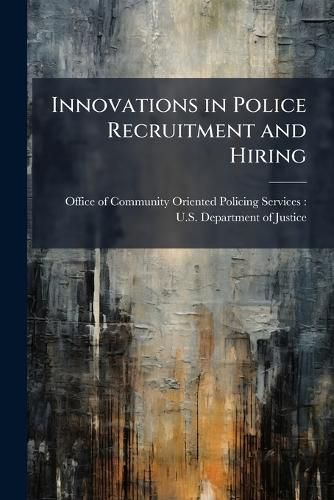Readings Newsletter
Become a Readings Member to make your shopping experience even easier.
Sign in or sign up for free!
You’re not far away from qualifying for FREE standard shipping within Australia
You’ve qualified for FREE standard shipping within Australia
The cart is loading…






As the issue of recruiting and retaining quality law enforcement officers makes national headlines, this report helps fill the void by telling the story of how five sites selected to participate in a COPS-funded project entitled "Hiring in the Spirit of Service," implemented significant change into existing hiring processes to recruit and select law enforcement officers that reflect a more service-oriented field. This document has relevance for all practitioners seeking to enhance their department's recruitment and hiring practices. Specifically, this publication discusses how each site progressed to meet its goals of hiring service-oriented law enforcement recruits and it describes the challenges encountered along the way as well as lessons learned that other agencies and practitioners can replicate.
This work has been selected by scholars as being culturally important, and is part of the knowledge base of civilization as we know it. This work was reproduced from the original artifact, and remains as true to the original work as possible. Therefore, you will see the original copyright references, library stamps (as most of these works have been housed in our most important libraries around the world), and other notations in the work.
This work is in the public domain in the United States of America, and possibly other nations. Within the United States, you may freely copy and distribute this work, as no entity (individual or corporate) has a copyright on the body of the work.
As a reproduction of a historical artifact, this work may contain missing or blurred pages, poor pictures, errant marks, etc. Scholars believe, and we concur, that this work is important enough to be preserved, reproduced, and made generally available to the public. We appreciate your support of the preservation process, and thank you for being an important part of keeping this knowledge alive and relevant.
$9.00 standard shipping within Australia
FREE standard shipping within Australia for orders over $100.00
Express & International shipping calculated at checkout
As the issue of recruiting and retaining quality law enforcement officers makes national headlines, this report helps fill the void by telling the story of how five sites selected to participate in a COPS-funded project entitled "Hiring in the Spirit of Service," implemented significant change into existing hiring processes to recruit and select law enforcement officers that reflect a more service-oriented field. This document has relevance for all practitioners seeking to enhance their department's recruitment and hiring practices. Specifically, this publication discusses how each site progressed to meet its goals of hiring service-oriented law enforcement recruits and it describes the challenges encountered along the way as well as lessons learned that other agencies and practitioners can replicate.
This work has been selected by scholars as being culturally important, and is part of the knowledge base of civilization as we know it. This work was reproduced from the original artifact, and remains as true to the original work as possible. Therefore, you will see the original copyright references, library stamps (as most of these works have been housed in our most important libraries around the world), and other notations in the work.
This work is in the public domain in the United States of America, and possibly other nations. Within the United States, you may freely copy and distribute this work, as no entity (individual or corporate) has a copyright on the body of the work.
As a reproduction of a historical artifact, this work may contain missing or blurred pages, poor pictures, errant marks, etc. Scholars believe, and we concur, that this work is important enough to be preserved, reproduced, and made generally available to the public. We appreciate your support of the preservation process, and thank you for being an important part of keeping this knowledge alive and relevant.